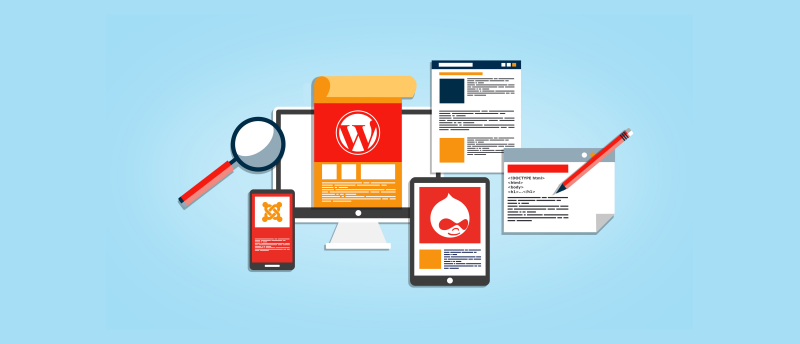Drupal to WordPress migration FAQ

These FAQs cover our Drupal to WordPress migration service including costs, timelines and technical questions. For a comprehensive coverage with insights drawn from almost 15 years of specialising in migration projects, please see our Drupal to WordPress Migration Guide.
Frequently Asked Questions
General Migration Questions
- 1. How much will a migration cost?
- 2. How long will a migration take?
- 3. Can I use a migration plugin and export the site myself?
- 4. Which Drupal versions can be migrated to WordPress?
- 5. What information do you need to get started?
- 6. Can we migrate only my content?
- 7. Can you answer some technical questions?
Questions About Our Drupal to WordPress Migration Service
- 1. How is your Drupal to WordPress migration service different?
- 2. What is involved the migration project discovery?
- 3. Can you cite some case studies for previous migrations?
- 4. What are my payment options?
- 5. Will the amount of content be a factor in price, complexity or timescales?
- 6. Do you comply with GDPR?
Technical Questions About the Migration
- 1. Can we preserve my search engine optimisation (SEO)?
- 2. How can we send you the database dump file?
- 3. Do you need my entire Drupal database?
- 4. Can you run a migration while we're developing the WordPress site?
- 5. Which WordPress tables will you write to?
- 6. What kind of migration tools and software do you use?
Book a Free Consultation
If you have more questions about how our Drupal to WordPress migration service can help you, please book a free consultation. We will be happy to schedule a call or video conference to talk through your requirements. No commitment is required and you will gain more insight into the scope of your project.
General Migration Questions

1. How much will a migration cost?
Fees for our Drupal to WordPress migration service depend on how much you'd like us to do. You might be a media agency or creative professional who wants help with only the technical aspects of a client site migration. Perhaps you're a site owner who needs someone to do everything from content migration to theme and plugin development.
The Guideline Project Pricing on Drupal to WordPress Migration Service Page will give you an idea of how much budget you should expect to allocate.
2. How long will a migration take?
Content Management System migrations can take anywhere from a couple of weeks to over 12 months, depending on the scope of the work. We will provide an estimate after a project discovery phase but here are some approximate timelines based on past projects.
| Migration type | Expected timeline | Deliverable |
|---|---|---|
| Discovery phase | 1-3 weeks | A detailed migration plan with timescales and budget. |
| Content migration only | 4-8 weeks | A database dump of your content that can be imported into a fresh WordPress installation. |
| Full site rebuild | 6-12 months | A fully functional WordPress site with a new design and all the functionality of your Drupal site. |
These estimates are typical in the industry as highlighted in some key statistics drawn from a 2024 WP Engine seminar.
For a general Drupal to WordPress migration project, most of the time is in discussing the migration requirements and reviewing the results. The content migration itself is automated and normally takes a few minutes to a few hours to run.
3. Can I use a migration plugin and export the site myself?
There are several Drupal to WordPress migration plugins and automated services available. Maybe they'll work for your site, in which case our migration service is not for you.
Indeed, migration plugins can convert Drupal content that have a clearly defined counterpart within WordPress. They do fall short in some important ways, however. A great deal of the most valuable content is routinely configured in ways that need human decisions.
For example:
- Which migration approach should you take?
- How closely will the approach meet your project's goals?
- Will one WordPress plugin or another better suit your workflow?
- What kind of compromises must you make?
These are critical decisions that cannot be automated.
If you're looking for a Drupal to WordPress migration service, chances are that you've tried a plugin and it failed. Alternatively, you might recognise that you need advice from an expert.
Many clients come to us because they tried a migration plugin and for some reason they weren't satisfied with the results. A custom migration service will inevitably cost more than an off-the-shelf plugin but if your website plays an important role in your activity, human experience will provide more value than short-term savings.
4.Which Drupal versions can be migrated to WordPress?
We can migrate any Drupal version including Drupal 5 and below, Drupal 6, as well as Drupal 7 and above.
5. What information do you need to get started?
To get started on a Drupal to WordPress migration we would need to know the following:
- Do you only need help with migrating the content or would you also need me to help with theme and plugin development?
- Do you know how many content types and custom fields need to be migrated?
- Are you setting up a new WordPress site or would we be migrating into an existing site with its own content?
- Would preserving SEO be an important factor in the migration?
- Do you know what was the final budget and timescales to develop the existing site?
- Have you already established an approximate budget and timeline for the migration?
A MySQL dump file or access to your database would also be essential to analyse the scope of the work.
These questions will be covered during the project discovery so you don't need to know all the answers before contacting us. You may use this Drupal to WordPress migration worksheet will help you with putting together the necessary details.
6. Can we migrate only my content?
Yes. There are two options when migrating your site.
| Migration type | Description |
|---|---|
| Content migration only | This is for when you already have a web developer to build your WordPress site and you only want to export the Drupal content. To do this, all we'll need is your Drupal database dump file or access to your database. |
| Full site rebuild | Aside from the content, a full migration would also include setting up WordPress, replicating functionality and either replicating the design as a WordPress theme or doing a re-design. This is essentially building a new site from scratch so in order to quote for this, we'd need either a specification document or access to your Drupal site in order to create one. |
7. Can you answer some technical questions?
Please see the Drupal to WordPress migration Technical FAQ section. If you don't find your question there, feel free to drop us a note.
Questions About Our Drupal to WordPress Migration Service

1. How is your Drupal to WordPress migration service different?
There are other options with a variety of pricing models. Our Drupal to WordPress migration service is for media agencies and site owners who need a WordPress database specialist to work with them throughout the migration process. We understand that it's often unnecessary to pay someone to do everything. For example, media agencies often have staff in-house who are great at design and front-end coding; they often don't need to invest time investigating the inner workings of Drupal and WordPress. Site-owners without technical or programming skill can do some tasks manually using the WordPress dashboard, thereby reducing the overall budget needed.
You deal with the migration team directly and we tailor the migration to the specific needs of your project. There are no set limits to the amount or type of content you can migrate. We work together closely to discover how best to approach the migration. Between us, we will strike a balance between your budget and work needed for you to comfortably take over your new WordPress site.
2. What is involved in the migration project discovery?
The discovery and planning phase involves working together to come up with realistic budgets and timelines for your project. This is essential because there's no such thing as a cookie-cutter migration.
A discovery covers:
- requirements specification;
- getting acquainted with your setup;
- putting together a migration plan, timescales and budget.
Project discovery is essentially a Q&A process hosted on an online project collaboration service. We start off with a checklist of standard questions that apply to most projects. Some of these won't apply to you so we can immediately mark these as not required. You then post your answers to the ones that apply in the form of comments and often these generate more questions targeted to your setup.
It's a fairly free-form process of asking questions, posting answers and building a list requirements. As we go along we'll both eventually arrive at a fairly good understanding of what will be needed for a successful migration. This phase is valuable in that it often brings up important issues that may not have occurred to you and we'll have to decide how to handle them.
At the end of this phase will have compiled a list of migration requirements which we'll use for budgeting and planning.
3. Can you cite some case studies for previous migrations?
Case study 1: Local news site
A site with over 45,000 Drupal nodes. Despite having a large amount of content, the migration was relatively straightforward because the client had a basic Drupal setup consisting of pages, stories and a few simple custom content types. They did not need any special functionality replicated.
Timescales: Migration completed within two weeks of starting the project.
Main challenges presented:
- Errors during import due to incorrect character encoding when the client made the database dump. This was easily fixed by showing the client how to correctly dump the database.
- Target WordPress environment kept running out of memory after export. This was solved by adjusting the client's server configuration.
- The client did not know how to operate their hosting control panel so this project also required unexpected sys-admin work.
Case study 2: Special interest site with global readership
A site with around 20,000 nodes, 4,000 terms and 10,000 user profiles.
Timescales: approximately 7 weeks from first enquiry email.
Main challenges presented:
- There were many duplicate terms that needed to be handled and cleaned using custom queries. (Duplicate terms cannot be migrated into WordPress.)
- An old Drupal module caused hard-to-find corruption that was causing the migration queries to fail. This was tracked down to a few entries that were incorrectly had a creation year of 1970.
- I needed to write many custom queries to handle very specific migration requirements. (e.g. removing unwanted posts, removing spam comments and authors, resolving duplicate content.)
4. What are my payment options?
- US-based clients may pay by credit card or bank transfer to my US bank account.
- UK-based clients may pay by bank transfer to my UK bank account.
- Clients within the EU may pay by credit card or bank transfer to my EURO bank account.
- Clients all other regions may pay by Bitcoin, PayPal or credit card. Other payment methods may incur additional transaction charges.
5. Will the amount of content be a factor in price, complexity or timescales?
No, the amount of content to be migrated is rarely a factor in project price, complexity and time. We write a set of custom migration scripts after analysing your site and requirements. The scripts can be run many times on your entire database and will do the 'heavy lifting' of the migration project.
The major factors that usually affect project price, complexity and time are:
- the number of custom content types;
- replicating Drupal modules as WordPress plugins;
- preserving SEO;
- the web design process for custom themes.
5. Do you comply with GDPR?
Yes, we comply with the European Union's General Data Protection Regulation (GDPR).
Under the GDPR, I'm classed as a data processor since our work involves obtaining, storing and processing databases which may contain personal information. As a small firm, the regulations are far more lenient for us. Nevertheless, in order to meet our clients' own GDPR-compliance, we have put in place the following measures:
- Our privacy policy has been updated for GDPR compliance.
- For each project, we only request the minimum amount of migration data to complete the project requirements.
- We delete migration databases and backups within 90 days after a project close-down. This length of time is necessary and reasonable as completed projects can sometimes restart with new requirements.
- We only work with third-party contractors or agencies who have been approved by our clients. When working with third-parties, we only transfer migration data to the contractor or agency after obtaining explicit permission from our client.
- We only use services that are PCI, DPA and GDPR compliant.
- We record migration database transfers to service providers in countries outside the European Economic Area (EEA).
- Full-disk encryption; encrypted communications and file transfers; and two factor authentication are enabled whenever possible to help prevent data breaches.
- In order to help detect if we've been breached, 'bugs' and 'honeypots' are implanted within our systems.
- If a data breach occurs that poses a risk to people's rights and freedoms, the project sponsor will be informed as soon as the breach is discovered.
Technical Questions About the Migration

1. Can we preserve my search engine optimisation (SEO)?
Search engine optimisation is a complex topic. The short answer is yes, we will be able to preserve your SEO. In practical terms, how much is preserved depends on your budget. If SEO is a primary concern, please let us know and we can discussion your options in detail. For more information about preserving SEO during a Drupal to WordPress migration, please see this guide.
2. How can we send you the database dump file?
The best way would be either:
- as a downloadable file on an FTP or SFTP server;
- via a private link to the file using a file sharing service like DropBox.
- through a file-sending service like DropSend.
Do not place the file in a publicly accessible location on your web server.
The dump file should be a compressed .sql file in UTF-8 character set.
3. Do you need my entire Drupal database?
Having access to your entire Drupal installation database is useful for troubleshooting and analysis but not necessary for most content-only migrations. At a minimum, I'll need the following Drupal tables:
- comments
- node
- node_revisions
- node_type
- system
- term_data
- term_hierarchy
- term_node
- url_alias
- users_roles
- users
- variable
- vocabulary
- vocabulary_node_types
- Any table pre-fixed with ‘content_'
- Any table pre-fixed with ‘field_'
4. Can you run a migration while we're developing the WordPress site?
An empty WordPress installation would make migration easier but theme and plugin development can often be done concurrently with content migration. The migration should be simple if whatever you're doing can be deactivated via the WordPress Dashboard and then re-activated at the end of the project.
Things get more complicated if your development involves significant configuration, adding content or users. Because of the way WordPress stores configuration information in the database, we'll almost certainly overwrite settings and possibly corrupt the site. Migrating content into WordPress installation with pre-existing content requires extra steps. It's possible but involves more work.
5. Which WordPress tables will you write to?
A typical Drupal to WordPress migration involves writing to the following WordPress tables:
- wp_comments
- wp_posts
- wp_postmeta
- wp_terms
- wp_term_relationships
- wp_term_taxonomy
- wp_usermeta
- wp_users
6. What kind of migration tools and software do you use?
We use a variety of custom-built tools and scripts, mostly coded in Python, that we've built throughout the years. We also use freely available open source software like MySQL Workbench and phpMyAdmin. When appropriate or if requested by the client, we sometimes use third-party migration services.